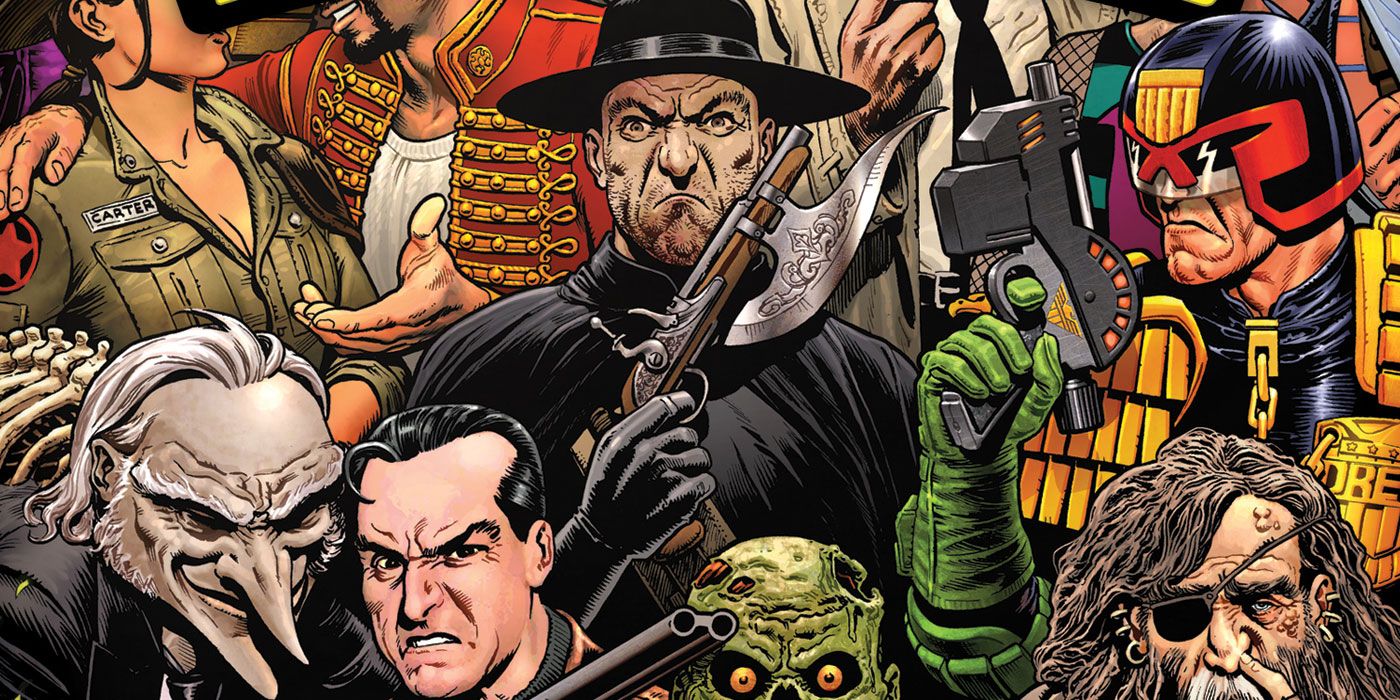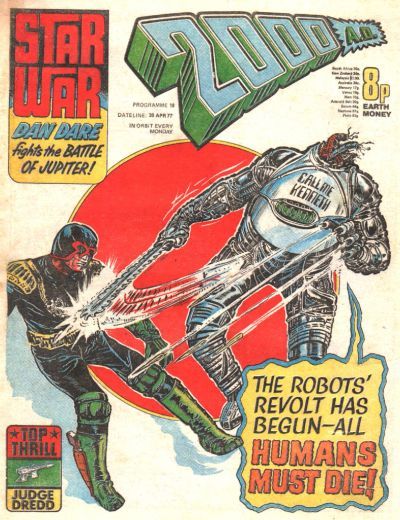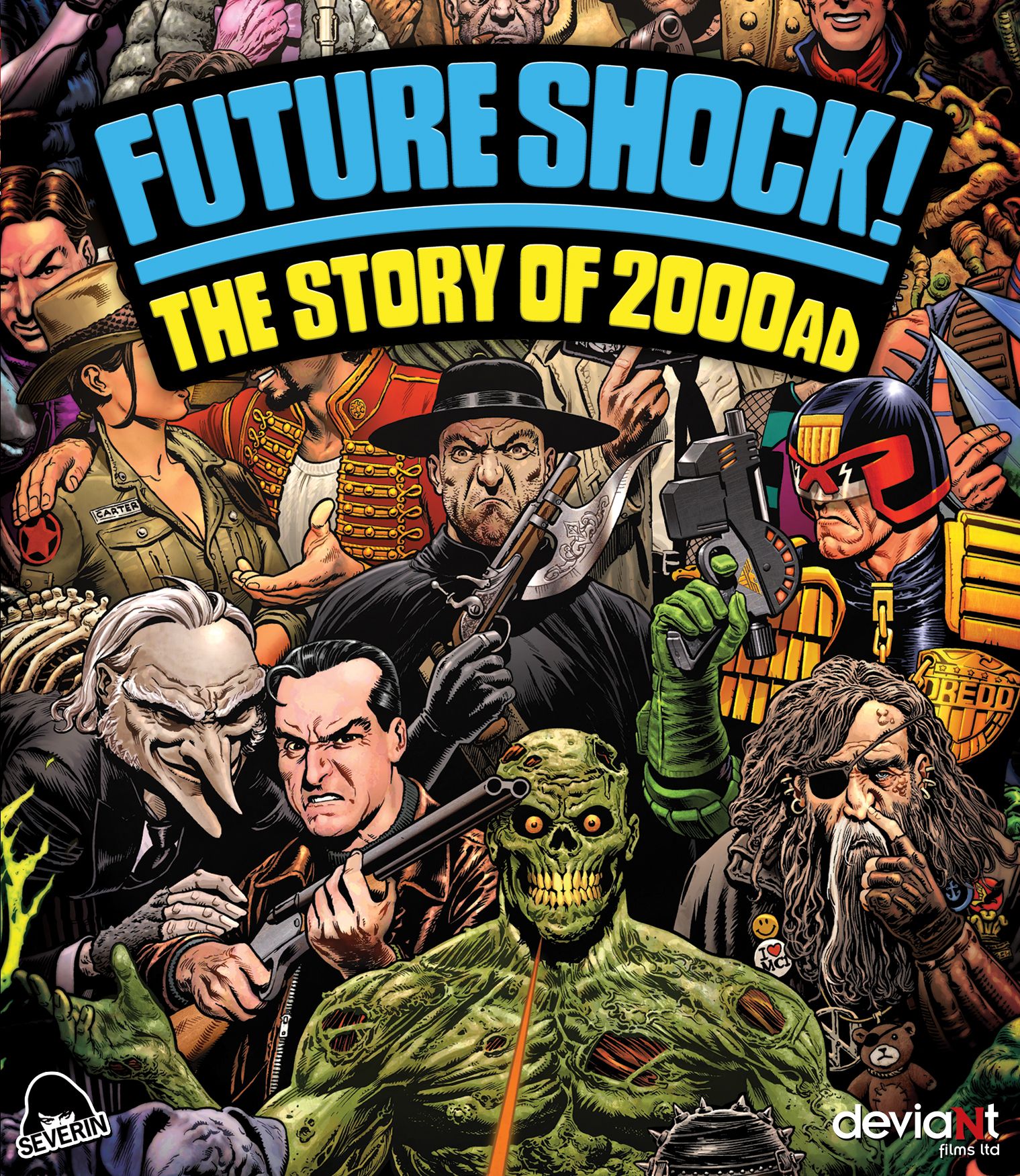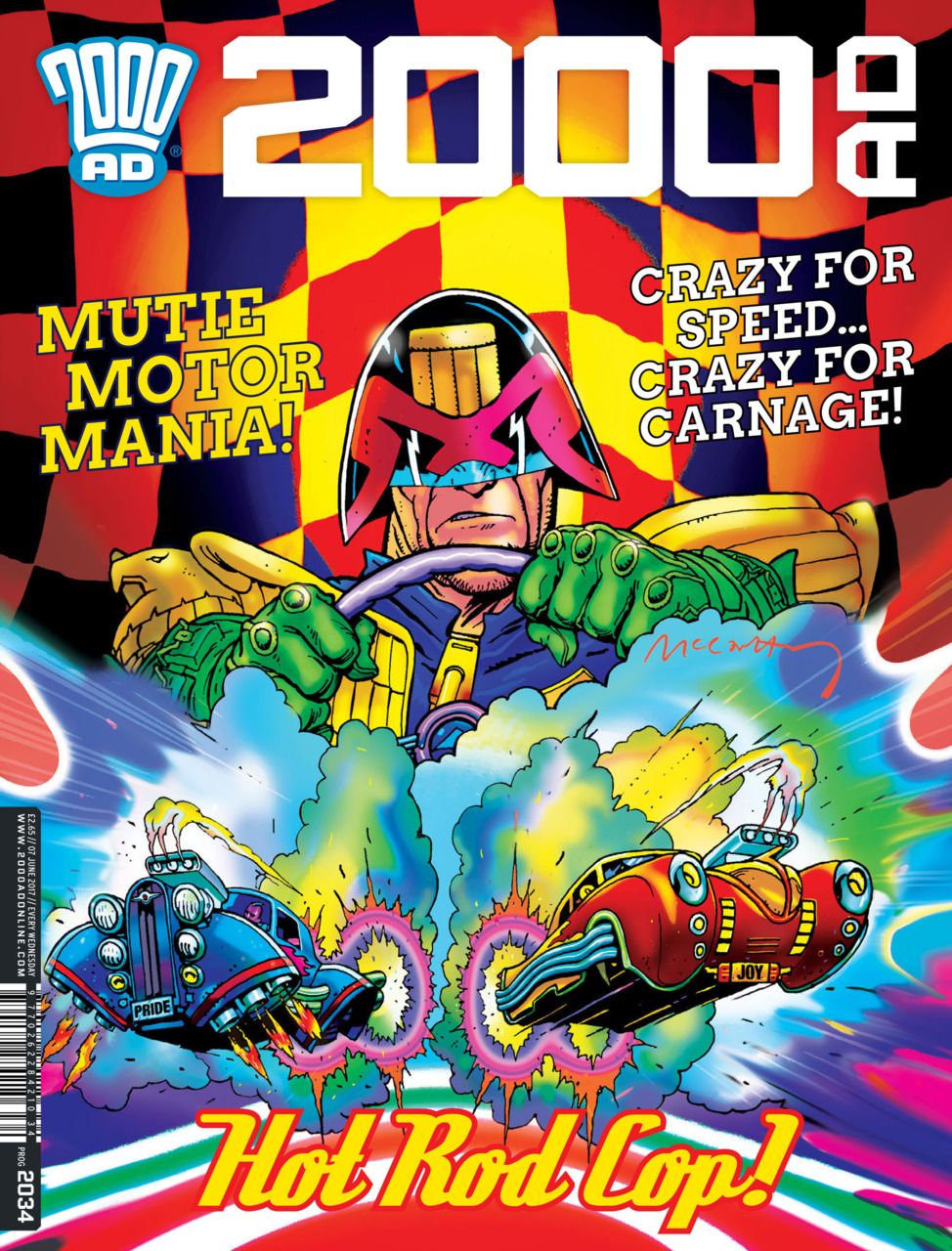Pat Mills can't quit 2000AD, and neither can the UK.
In 2017, the iconic British science fiction comics weekly celebrates 40 years of twisted tales, strange alien conquerors and of course the most intense lawman ever in Judge Dredd. And to celebrate the milestone, a number of new releases have hit retailers including a new BluRay edition of Severin Films' documentary Future Shock! The Story of 2000AD and Mills' own written recollections of its early days in Be Pure! Be Vigilant! Behave! 2000AD & Judge Dredd: The Secret History.
RELATED: Live-Action Judge Dredd Show in Active Development
And Mills is the very man to tell that story. As the creator and founding editor of 2000AD, the creator assembled the original talent lineup and voice for the magazine for UK publisher IPC in the 1970s, and he helped define Dredd's outlook and world alongside the character's creators writer John Wagner and artist Carlos Ezquerra. Though his stint as editor only took him through the first months of 2000AD's existence, Mills has remained involved in the title's fate for decades – mostly as a writer of both Dredd tales and a number of original serials like barbarian adventure Sláine and the sci-fi/fantasy mash-up Nemesis the Warlock with the legendary Kevin O'Neill.
CBR spoke with Mills about the history and legacy of 2000AD including his expectations for its long success, the American underground comix that inspired Dredd's creation and how the magazine can forge a path forward with a new Dredd TV series and hopefully renewed interest in the print stories that still hit week after week from Rebellion publishing.
CBR News: Pat, there's a lot going on surrounding the 40th anniversary of the magazine, but I wanted to start by just talking about that number. When you started 2000AD for IPC, did you have any kind of expectation for how long it could go? I'm sure you didn't plan on 40 years as a possibility, but did you have a lot of expectation beyond ten issues or so?
Pat Mills: No, I always knew it would last. And that's not arrogant. I think that when a company like Marvel or DC when they create characters like Spider-Man or the X-Men, or at least I imagine when they create them, they really think, "Hey, we've got something good here, and it's going to last." They may not think it's going to last 40 years. But I think Stan [Lee] may have thought that about a few things. You'd probably know better than me.
For us, in British terms, a long-running series is the equivalent of those Marvel books. If you look in France, it's a similar thing. I do a fair bit of work in France these days – notably Requiem Vampire Knight – and when that series was created, the first thing the editor said to me was, "How many volumes do you think the first series will be?" Well, it actually ended up being 13 volumes, one-a-year. We had planned for 13 years even on the first storylines. So we tend to think of these things as having longterm possibilities.
Though I know that before you put together the original 2000AD, you had done a magazine called Action that didn't last long – presumably because it was too real. A harsher action book set in real wars seemed a bit much for the UK market. As a result, part of the DNA for 2000AD was not just the tone of it, but it was the heavy science fiction focus. Did you feel like making that distinction in the magazine would allow you to be more subversive in a way that was palatable and could feed success?
RELATED: Karl Urban Could Return For Judge Dredd TV Series
You're absolutely right about the history there, and I suppose the answer is "Yes and no." I was very aware – and this is still a problem today – that you retreat into science fiction, and you can try to be more subversive, but theoretically you end up being less subversive. Because the whole thing with this is that people invariably get involved with the wrapping paper much more than with what's actually in the box, if you catch my meaning. We'll like the setting or this or that, but the subtext of the story can and often does completely pass some readers by. They just don't want to know about it.
There is a price you pay for science fiction. And that is beautifully summed up by the – and I'll put it in heavy quotes – "science fiction story" The Handmaid's Tale. The TV series is theoretically science fiction, but my God does that carry a hell of a cloud. It's interesting that the author doesn't actually like it to be called science fiction. All those factors you could put into the mix with 2000AD, and you can't win them all. It's a challenge. There's definitely a price you pay with science fiction.
Tell me about the birth of the voice of the magazine. You wrote so much material in the early issues, but there's also Tharg the Mighty – the so-called editor who's become a fixture of the tone. In America, we have a history of "horror hosts" in comics dating back to EC Comics in the '40s, but what was your inspiration for using this technique in 2000AD?
[Laughs] That's an interesting one. When we brought the comic out, we were aiming at a young-ish readership. Probably again to parallel Marvel, I imagine that when Spider-Man first came out they were aiming at fairly young kids. At that stage, we needed some kind of voice, and after a couple of alternatives were considered, we went with Tharg.
Now after the comic grew up and very quickly became sophisticated – and as we got a major coup when a few years down the line we finally were able to give credit in the comics thanks to Kevin O'Neill – it suddenly became obvious to me that Tharg's time was over. As one of the creators of Tharg, I said, "He was okay when we first came out with a younger readership, but now the readers are growing up with the comic, let's get rid of this guy. For me, he's an embarrassment." And many, many readers agreed. If you were to ask the remaining readers today, I'm sure they'd say otherwise. I'm sure it's like a comfy pair of slippers. You get used to it. I think if they tried to get rid of him today, there'd be an outcry.
RELATED: Comic Legends: Was There Nearly an Alan Davis Batman/Judge Dredd?
Though it's not unheard of to get rid of fictional characters once they've served their purpose. If you look at the British satirical magazine Private Eye, they had Gnome – a fictional press baron who lasted for maybe two or three decades, but in the last two decades they got rid of him. So there's some method in my madness if you like, but it ain't gonna happen now. They like Tharg. I think his time is gone. And many readers in the past felt the same way.
Like I said, you only edited the mag for its opening salvo, but you've also stayed connected to 2000AD for years both in terms of writing many serials for it but also seeing your outside work effect it. The magazine Toxic! that you briefly edited is seen as pushing 2000AD to go full-color, for instance. Do you feel a sense of ownership with 2000AD, or is it just that its life happens to run parallel to your own work?
I think it's more like it owned me! [Laughter] Bear in mind, my job was to create comics and then move on. So I prepared the first three months of 2000AD before I left. I edited the first 12 issues, and then planned the next 12 or so after that. That was my job on a number of comics. 2000AD wasn't the only one I did. I did Battle and Action and the girls' comic Misty. That's what they hired me for. And somehow, I seem to be unable to escape 2000AD. It's like a longterm marriage. [Laughs] I rather fear [breaking up] is not going to happen now.
What is your view of the legacy of the magazine outside your own work? One thing we hear from a lot of people is that 2000AD is the place where British comics talent make their mark and establish their names. Do you feel that the talent itself is the biggest legacy, or is there something about the magazine as an institution that keeps it relevant?
Well, I don't feel that that American point of view – what you just said – is absolutely true. It's advantageous that American comics got that British contingent. But that style that is in a lot of American culture which I love – whether it's Breaking Bad or Larry David – is in my opinion singularly lacking in American comics. There's a hole there, and British creators came along and filled it, I guess.
From our point of view, well...I've got this book coming out about the history of 2000AD, and I say in it that America wasn't actually the first call of the kind of creators you're imagining – people like Dave Gibbons, Mike McMahon and Kevin O'Neill. Our first port of call was actually France. That's where we all went. We tried to break in in France. It's probably too long a story to go into here, but when we all had trouble breaking into the French comics industry, it was subsequently that people turned to America. It wasn't a first choice. It might appear that way. And often I think folks like DC like to present it that way. But it wasn't always the case.
RELATED: The Reggae Origins of Judge Dredd
To me, this isn't something that's fully understood or maybe it's something that people don't want to understand, but 2000AD was largely based on French comics and American comics which had a very strong French connection like Mike Kaluta, Bernie Wrightson and so on. So for me, going to France was what I preferred to do. But other creators who liked superheroes found America to be a better bet. So I think that answers your question in terms of America.
In terms of Britain, of course, 2000AD is such a major part of British culture on so many levels, it's hard to know where to start. The majority of key people in British media who are related to science fiction in one way or another are huge 2000AD fans. It's an ongoing process, and of course in some ways I think it's reaching a new high point with recent developments in Judge Dredd and of course the new Judge Dredd TV series.
Let's talk about Dredd. One of the things that I've always found fascinating about Dredd from an American point of view is that he seems like a British version of what nightmare America can be. This country is viewed as a massive force on earth, and it seems many creators are interested in taking a piss on the uglier parts of the American identity through that strip. Was there a reason out the gate you wanted Dredd to be American?
I think it's always been the case that Europe has this fascination with America. If you look at France, for example, one of their leading characters is Blueberry, which is a Western. So I think it's quite a common thing. A lot of film and television obviously comes from the States, so it's a reflex in a way. Again, I talk about this in my manuscript, and someone in there gave me good insight into this, and I'll see if I can find it on my shelf here. I think the point you're making is that there is an edginess in that view of America. The edginess that your country is likely to experience more, because first there was George W and now there's Donald Trump. I think you guys are probably bracing yourselves for more of the same. But I think that has roots that go back a very long time. That was always in our minds – this image of America with some positive things but also with some things that from a very British perspective are negative. There's no other way I could put that.
And I wonder if Dredd is not going to be up for rediscovery with American comics readers in the near future as we've got so much talk of fascism in the Trump era, and here's a brutal lawman.
It's always been a challenge [for him to break that market]. There's a Serbian film director here in my book who said, "Dredd has always been more radical, more punk rock, more on the edge than American superheroes," but in this director's opinion, he's too alternative/tough for America and not artistic enough for most of Europe. And I think it's an interesting analysis because it shows the difference. Probably with the IDW version of Dredd, there's a little accommodation of that for an American audience.
But again, not to just turn you onto my manuscript, but there's a bit in here where I talk about how the idea for Dredd comes from an American underground strip. I don't know if you're aware of that, but here it is how I wrote about it in my first draft: "John Wagner and I were both impressed by black comedy. An American underground strip 'Manning' that appears in Comix: A History of Comic Books in America, by Les Daniels. It featured a ruthless cop who shoots a fleeing criminal in the back." To quote from the strip where the cop is talking, "Some call it police brutality. He calls it justice! Crime in the streets. People going wild. Somebody's got to do something about it. That's my job...I'm a cop. My name is Manning: special agent attached to the Bureau of Nocturnal Traffic. My job...JUSTICE. They say that this is a world of many colors or shades, that there is no black and white...they're wrong. Just as sure as there is good and evil, I am good and if they get it from me they got it coming." [Laughs] It's an underground strip, and it's meant to be funny. I mean, it's American humor.
Definitely. It's interesting because I never knew of this piece of inspiration for Dredd, but as soon as you started reading it, I said, "This has got to be Spain Rodriguez." It makes perfect sense. He always drew dudes in leather riding motorcycles.
Yeah! Like I said, I always had this Les Daniels book Comix: A History of Comic Books in America. I think it must be a British book. It was very inspiring. And John Wagner also loved this story from Creepy #73 from 1975. The story was called "Purge" written by Bruce Bezaire with art by Jose Ortiz. In "Purge," a futuristic cop hunts down a suspect for a terrible crime, which we discover on the final page was reading a copy of Creepy. I should add at this point that these stories were not unique. There was a whole raft of these things, because it was an interesting time to be living in. Everything we read and watched was all like that. Fahrenheit 451, Logan's Run, Death Race 2000, Rollerball...I mean, the list is endless. I think you could say in a certain sense that Judge Dredd was inevitable.
Bringing things full circle, I wanted to get your take on where 2000AD is today. The British comics market has been in flux. Longstanding magazines like The Dandy don't exist anymore. Some kids comics like The Beano and The Phoenix are still going, but the mass market isn't what it once was – especially for adult comics. I feel like 2000AD is in some ways the last comic standing over there, and I wonder if you feel that it can also show the way forward for what British comics should be.
You're absolutely right in your analysis. We are kind of the last man standing, though there's one other exception which probably slipped past your radar, and that's called Commando Picture Library. It's a monthly single-story book that's been going quite a while. But 2000AD is really the only big one left. The reasons why that is, I go into in my book, but it'll come as no surprise to you that of course it's about money and it's about rights. And it the money and the rights are not good, and if they're better in France or in America, then that is where people will go. The good news is – and this may be false optimism on my part – but I think having a Dredd TV show will be a game-changer. I would have thought that if it's successful, it'll reach a lot of people, and therefore there will be a lot more monty coming in.
The interesting problem is that the comic itself grew up with its readers. That might sound really cool, and I know it's also happened with Marvel and DC. But with those guys, if I understand it correctly, they get new generations of kids coming in because of Spider-Man and Batman. That hasn't happened with 2000AD. In other words, we overreached ourselves. Your average readers today would probably for the most part start in their 30s. Apologists will say that that has to do with competition from computer games and the like, but if you look at other countries, you can see that it's nonsense.
Can it change? Like anything else, if there's enough money pumped into it, then of course it can if people want it to change. Personally I think 2000AD is held in very high regards partly because, hey, we've got a 40th birthday. The sense of the status that represents is strong. And there's a lot of merchandising. But we've still got a long way to go. And whether or not we can get those kids back is another matter, and my God is that a tough one. Marvel and DC can show it can be done, but I imagine they've had a lot of bumps along the way.
And there are a lot of people who will tell you that Marvel and DC need to do more to get kids to read their comics rather than just buy their t-shirts.
And I think that's the problem we have here. People in the UK will often know Dredd or other characters like my characters Sláine or Nemesis, but they tend to not buy the comic on a weekly basis, dammit! [Laughter]
Both the BluRay edition of Future Shock! The Story of 2000AD and Mills' own Be Pure! Be Vigilant! Behave! 2000AD & Judge Dredd: The Secret History are available now.




